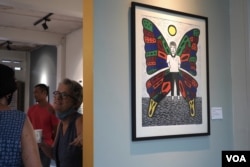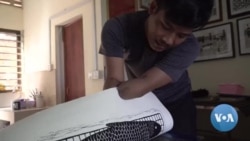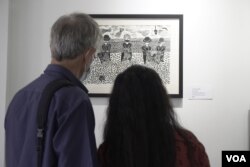PHNOM PENH/SIEM REAP — On a recent afternoon, on the third floor of a 1950s building in Phnom Penh’s old riverside center, artist Morn Chear was showing visitors around an exhibit of his work.
After a while, he turned to a 2020 piece titled “Metamorphosis: Rainbow,” which symbolizes a profound change in his life. The gentle image with black-and-white contours shows a young man without forearms. From his backside rise two giant colorful butterfly wings while a bright yellow sun shines overhead. He appears ready to fly off.
“I treat myself as a butterfly egg, which couldn’t get out” until realizing his artistic talents, Morn Chear said.
“Now that I arrive here at this point of my life, my wings represent my new path in art,” he told VOA Khmer, adding that his art had removed discrimination against him and “changed my livelihood from being disabled [to work] to being able to improve my family income and well-being.”
During the recent exhibit, Morn Chear, 31, was visibly enjoying his first chance to show his work after COVID 19-restrictions were relaxed. Much of the last two years he spent working in a tiny atelier he rented next to his Siem Reap home.
His main technique involves first making a drawing and then cutting the image into a woodblock that is used to print a classic black-and-white image, to which he sometimes adds bright color paints. It’s laborious and takes up to two weeks to finish, but he is aided by his wife, Phun Thou, 39.
With initial help of his mentor, Open Studio founder Lauren Iida, Morn Chear discovered his love for the technique and he has now produced more than 60 artworks. They depict personal experiences and rural themes, such as Cambodian folktales, as well as social issues like environmental degradation and domestic violence from the perspective of rural communities.
His works have been exhibited internationally and a current exhibit, called “Tomorrow is a new day,” is being held at Denver’s McNichols Civic Center Building.
From tragedy to triumph
Morn Chear’s path to the discovery of his talents and artistic success was long and difficult, however.
Born in a poor family with six children in the small village of Trapaing Chap, near the port town of Kampot, he had few chances to gain schooling or artistic training, and dropped out of school at 13 to help the family’s make ends meet.
“As I remember when I was a young cowboy, I liked picking up a wooden stick to draw on the soil by the riverbank. I didn’t realize or dream of being an artist back then,” he said.
In his teens, he mostly worked as a construction laborer, until one day, in 2010, he had a terrible work accident.
An electric shock caused him to lose both his forearms, leading to excruciating pain and long recovery, followed by deep depression that lasted for years. As the then 21-year-old struggled to find out a way forward in a society where manual labor is often the only way to earn a living, and where disability can be socially stigmatizing.
“I felt very resentful. I thought I couldn’t do anything. Sometimes I thought of ending my life,” he said. “I didn’t feel like participating in any celebration in my village, including visiting a [Buddhist] pagoda or going to the market. […] I felt embarrassed and insecure when many people looked at me whenever I was in a public place.”
Morn Chear’s family and relatives tried to cheer him up, and his uncle gave him his first job after the accident, asking him to herd his flock of ducks. This lifted his sorrows and he could earn about $70 per month. It required him to move around and camp overnight to ensure the ducks’ access to water and food, but it was a major step in improving his mental well-being.
He has depicted this time in his life in another cherished, black-and-white print block image from 2019.
Discovering Art
In 2017, his mother called him to urge him to join a program in Kampot that was being organized by a charity called Epic Arts, which seeks to empower people living with disability through art.
He had doubts about joining, but enrolled anyway into their two-year program and flourished.
“Joining Epic Arts makes me want to live. I started to feel I wasn’t alone. Unlike when I was in the village, it was only me who lived with disabilities. [In the program] I saw some people who are more struggling than me. It motivated me to want to live my life and work harder until today.”
He graduated in 2019 and met Phun Thou, 39, a contemporary dancer and staff at Epic Arts, who he married in 2019.
‘He works really hard’
His artistic talent emerged around 2017 when met American-Japanese artist Lauren Iida. She had opened her Kampot home to provide support and working space for local emerging artists, an initiative that later developed into Open Studio Cambodia, which also helps sell the art works.
When Morn Chear first came, “He was doing a lot of singing and dancing, and some drawing, but he never tried block-print before, so I taught him how to do that,” Iida told VOA Khmer in online interview from Seattle, the United States.
She explained his success through his talent and personality. “He’s very positive… he always says: ‘I don’t know if I can do that, but I want to try.’”
“He works really hard to just be a person in the world. Because of his disability, everything is very slow and very difficult for him to do a normal thing that is just really easy for other people. He really is so dedicated,” Iida added.










